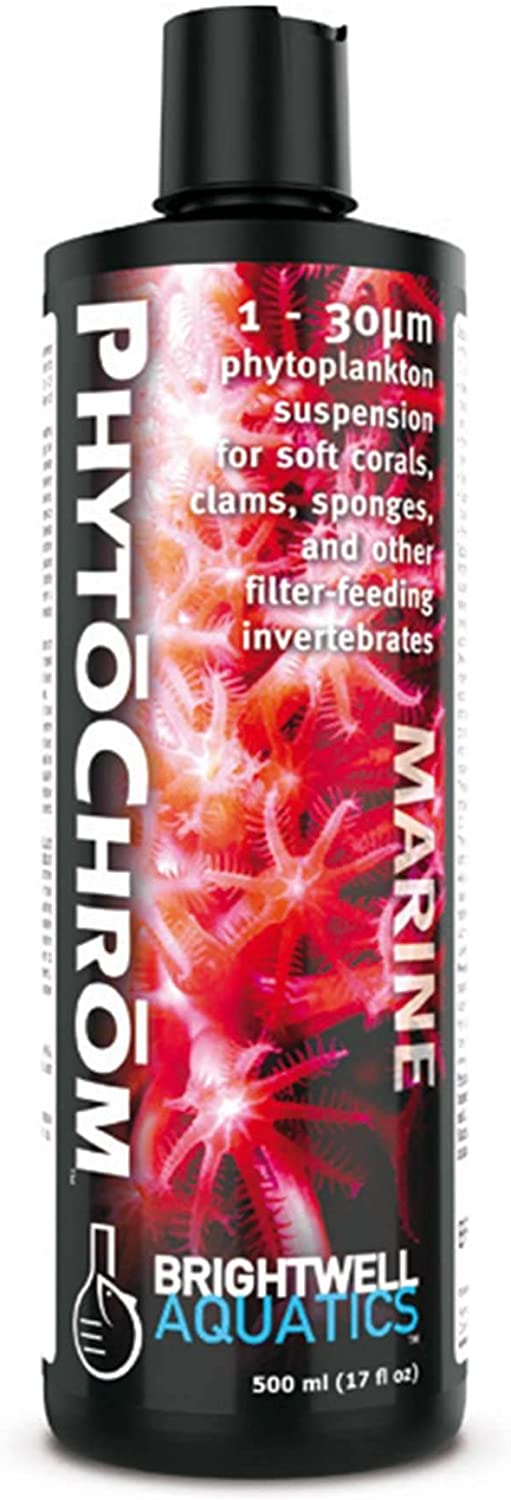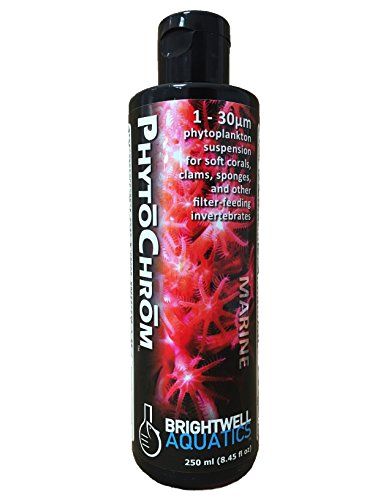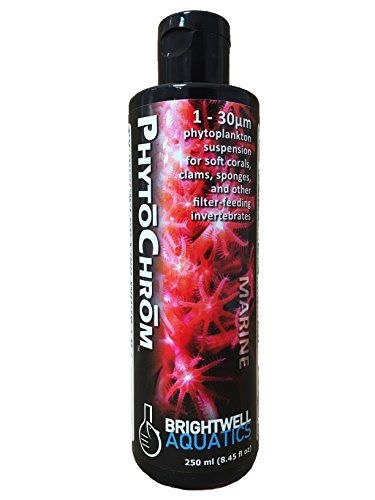Description
PhytoChrom
1 - 30µm Phytoplankton Suspension for Soft Corals, Clams, Sponges, and Other Filter-Feeders
Overview
- Provides 6 types of phytoplankton ranging in size from1 - 30µm.
- Ideally-sized for many soft corals, clams, sponges, tunicates, tube worms, bryozoans, larval crustaceans, and juvenile fishes.
- Formulated to provide over 200-million phytoplankton cells per ml.
- Does not require refrigeration.
- Supplemented with a proprietary amino acid to aid in coloration of invertebrates.
- Formulated by a marine scientist.
Sizes
500ml
Technical Background
Brightwell Aquatics PhytōChrōm is a concentrated suspension of six different species of marine algae ranging in size from 1 - 30µm and having an extremely diverse nutritional profile, rich in a number of fatty acids including the omega-3 fatty acids EPA, ARA, and DHA, as well as in chlorophyll, carotenoid pigments, vitamins, minerals, and several important amino acids. Of particular interest are omega-3 fatty acids and pigments, for these substances have been shown to provide tremendous benefit to the overall health and coloration of filter feeding and planktivorous organisms.
The algae in PhytōChrōm fall within three size classes of plankton: picoplankton (0.2 - 2.0µm), nanoplankton (2.0 - 20.0µm), and microplankton (20.0 - 200.0µm). They are the proper size for feeding many species of soft corals (particularly those with short tentacles), as well as clams and other bivalves, sponges, tunicates (sea squirts), plumed worms (Christmas tree worms, feather dusters, etc.), bryozoans, larval invertebrates such as those of many crustaceans and bivalves, and juvenile fishes.
PhytōChrōm may be used in conjunction with other planktonic suspensions to provide a complete range of sizes to filter-feeding and planktivorous organisms.
PhytōChrōm does not require refrigeration, however storage in a cool, shaded area will prolong the activity of the vitamins. Refrigeration will maximize the shelf-life of the product.
Instructions and Guidelines
Shake product well before using. Turn protein skimmer and other forms of mechanical filtration off prior to adding food suspensions to aquaria, and allow 10 - 15 minutes after feeding before resuming operation of filtration.
Target Feeding (recommended): Target feeding may be carried out with a lengthy piece of rigid air tubing, plastic syringe, pipette, dropper, or similar device; pour 5 ml (1 capful) into a small container and suck a portion of this into the feeding device, then slowly discharge the contents of the device 2 - 4” upstream of the target organism(s). Repeat these steps as deemed necessary. Rinse the portion (inside and outside) of the feeder that was placed into aquarium water before placing it into this bottle (if feeding directly from the bottle rather than from a separate container); failure to do so will contaminate the product and encourage it to decompose.
Broadcast Feeding: Add up to 5 ml per 50 gallons of water in the entire aquarium system in an area of rapid water movement daily for the first four weeks of use; thereafter, the dosage may be increased as desired.
Notes: Add no more than 5 ml total of liquid food suspensions per 50 gallons of water in the entire aquarium system daily for the first four weeks of use; thereafter, the dosage may be gradually increased as desired. Starting out at a low dosage and gradually increasing it with time will allow the biological filtration in the aquarium to adjust to the increase in nutrients and prevent water quality from deteriorating.
Planktonic food suspensions (such as this one) are best utilized by target feeding specific invertebrates in an aquarium; in doing so, the majority of the food may be consumed by the intended organisms rather than ending up in filtration media or indirectly impacting water quality (as often occurs when indescriminately “broadcast feeding” by adding liquid food suspensions to a stream of water and allowing the contents to disperse randomly throughout the aquarium system).
Food Rotation: Foods for corals should be rotated to provide variety and a more complete nutritional profile. Brightwell recommends that you don't just mix all your foods together and feed the same thing every day. Feeding a broad range of nutrients will more closely simulate what animals encounter in their natural habitat. Do some research on your animals to see what their nutrional needs are. Brightwell makes a number of different planktonic and particulate foods that can be rotated to provide a more balanced diet. These can be fed in addition to the CoralAminō and Restōr which can be fed every day along with those foods. Some of them are: PhytōChrōm, PhytōGold, PhytōGreen, Zooplanktōs, Reef Blizzard A, L, O, and S, UltraPlanktōs, Macrōvore , Micrōvore, and Reef Snow.
Caution: Keep out of reach of children. Not for human consumption.
Guaranteed Analysis
Moisture (max) 97.10%, crude protein (min) 0.45%, crude fat (min) 0.23%, crude fiber (min) 0.85%, ash (max) 3.10%.
Ingredients
Purified water, Haematococcus sp., Nannochloroposis sp., Tetraselmis sp., Isochrysis sp., Pavlova sp., Thalassiosira sp., Ascorbic acid, Citric Acid







